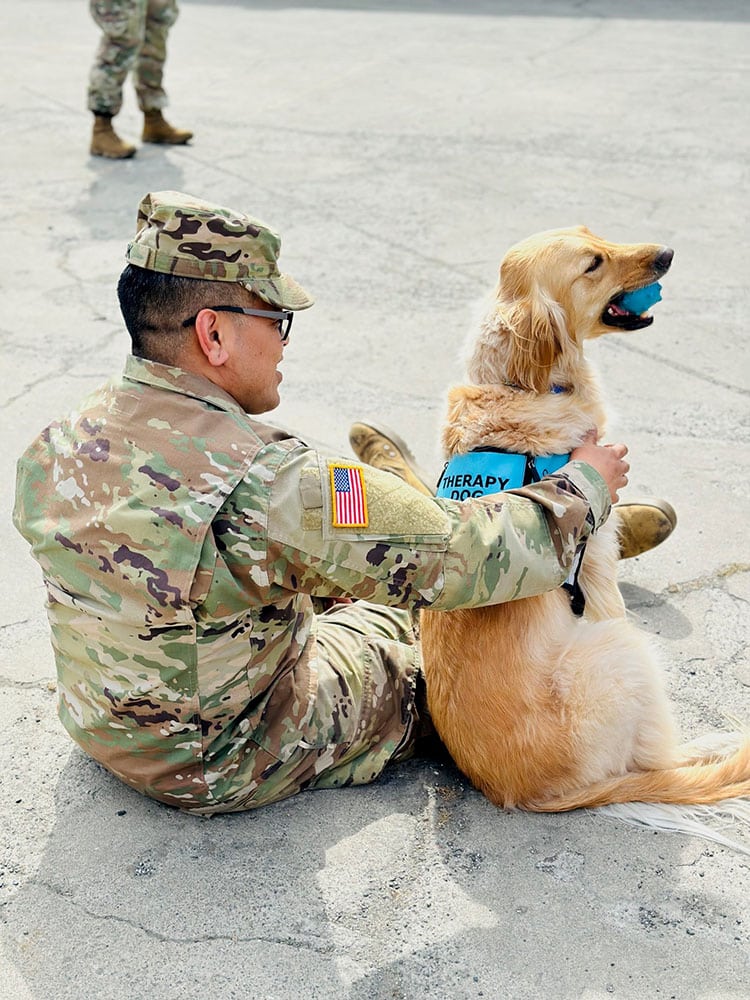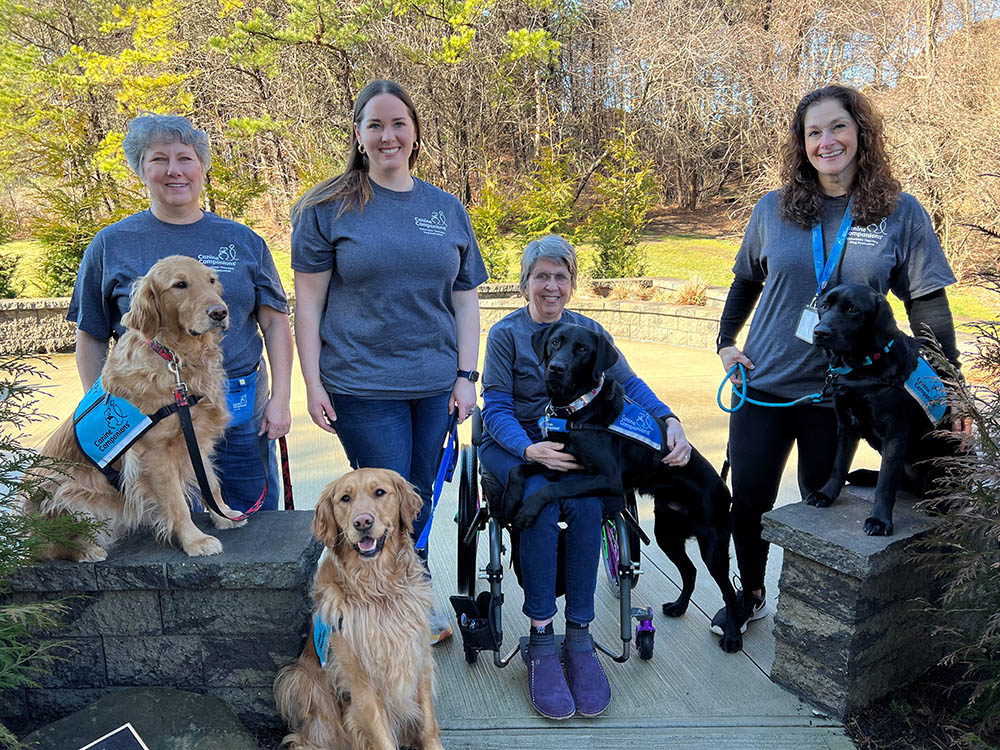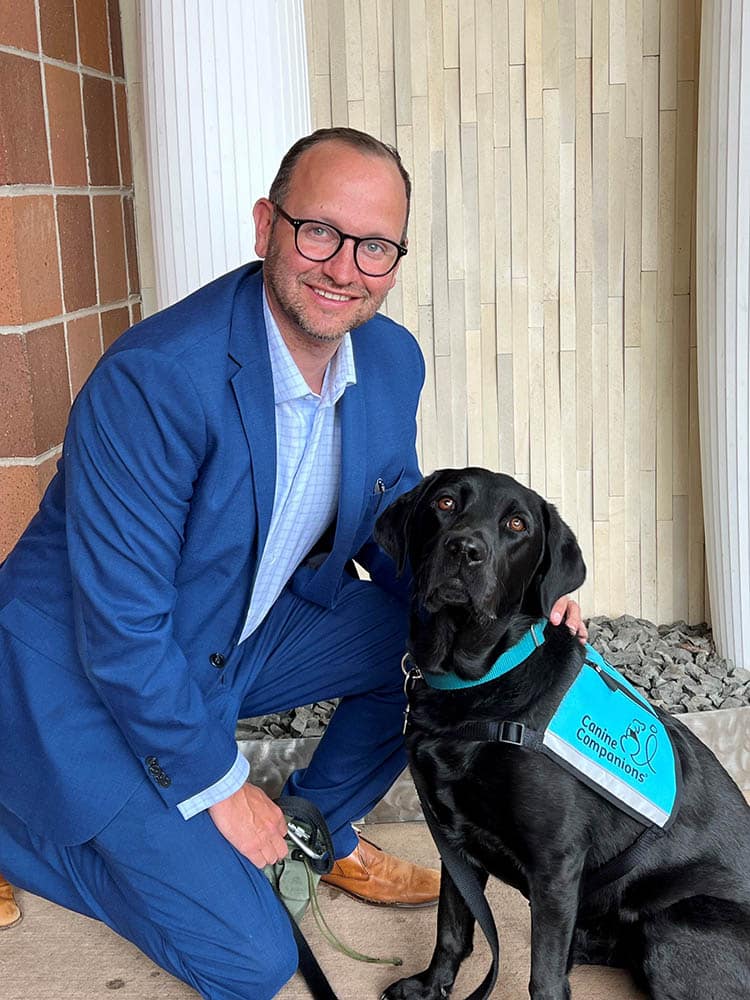Home » Get Involved » Therapy Dogs
Therapy Dogs
Learn more about our therapy dog certification program.
 At Canine Companions, we believe in the joyful, transformative power of the human-canine partnership – in every form! More than one-third of dogs released from service dog training have gone on to serve as therapy dogs in their communities. We think that’s incredible, and we are proud that through our therapy dog certification program, we can continue to support and engage volunteers while providing suitable released dogs with impactful jobs.
At Canine Companions, we believe in the joyful, transformative power of the human-canine partnership – in every form! More than one-third of dogs released from service dog training have gone on to serve as therapy dogs in their communities. We think that’s incredible, and we are proud that through our therapy dog certification program, we can continue to support and engage volunteers while providing suitable released dogs with impactful jobs.
While our mission is to provide highly trained service dogs to people with disabilities, we believe that the incredible work therapy dogs do is an important extension of our core mission. With this program, we can exponentially increase our impact across the country.
A therapy dog is a pet that accompanies their owner into specific settings for the benefit of the residents or clients in the setting and/or as part of a therapeutic intervention. Studies have shown that interacting with therapy dogs as part of an animal-assisted intervention approach yields both physical and psychological benefits to humans and the dog. Our therapy dog program provides formal therapy dog certification for Canine Companions eligible teams in all regions within specific geographical locations. Although we are still rolling out the program, our goal is to have certified teams across the country in the future (see below FAQ’s “Am I eligible to apply for a therapy dog”).
All Canine Companions dogs receive extensive temperamental and medical evaluations, and dogs selected for this program must be approved by our expert staff in both our national veterinary and training departments. Only a small number of dogs that qualify for the program will be available to those that were not the dog’s volunteer puppy raiser. Our waitlist to adopt a release dog is limited.
The Canine Companions Therapy Dog Certification Program is an American Kennel Club (AKC) recognized program. Teams that are certified through this program are eligible to receive AKC Therapy Dog titles.
Volunteer Therapy Dog Certification
 To be eligible for certification as a therapy dog handler, applicants must:
To be eligible for certification as a therapy dog handler, applicants must:
- Live within the designated program area
- Have an eligible Canine Companions bred dog whose temperament is appropriate for therapy dog work and are:
- Released dogs over 1 year of age
- Retired breeders
- Retired Service or Facility dogs
- Active male breeders, at least 6 months post-placement, with additional approval from the breeding and veterinary departments.
- Complete coursework and examinations in preparation for certification.
- Meet with a Canine Companions evaluator for in-person evaluations including the Canine Good Citizen (AKC CGC®) tests and a simulated visit.
- Participate in ongoing Canine Companions training and annual recertification through the therapy dog program.
- Demonstrate the ability to safely and effectively control, manage, and care for the dog.
- Have adequate vision to observe, intervene, and manage a dog’s behavior.
- Volunteer with their setting of choice or incorporate the therapy dog into their eligible professional work for a minimum of 24 hours per year.
*Some dogs may have conditions to their certification based on their release reasons that must be adhered to for the duration of their certification with us.
If you are interested in applying to be a Canine Companions therapy dog handler, please click here to fill out an application request.
Volunteer Therapy Dog Evaluator Certification
 Canine Companions seeks eligible volunteers to administer the training and evaluation for therapy dog teams in the field.
Canine Companions seeks eligible volunteers to administer the training and evaluation for therapy dog teams in the field.
To be eligible to volunteer as a therapy dog evaluator, applicants must:
- Be a Canine Companions volunteer having completed the formal volunteer interview and volunteer onboarding process.
- Have a documented minimum of 100 hours of experience as a therapy or are a facility dog handler with a Canine Companions dog.
- Obtain and maintain active status as an AKC Canine Good Citizen (CGC)® Approved Evaluator.
- Be familiar with therapy or facility dog settings.
- Be willing to complete training specific to Canine Companions, including attending an in-person training course.
If you are interested in becoming a volunteer evaluator, please click here for an application request.
Therapy Dog Adoption
Eligible released dogs (not adopted by their puppy raisers) will be available for placement with external applicants who are willing to make a 5-year commitment to our therapy dog program. If you are interested in adopting a therapy dog and agree to commit to 5 years of active therapy dog certification with us, please submit a request for an application here.
FAQs
Therapy dogs are invited in certain settings to increase the well-being of clients, residents, and students in places such as hospitals, schools, and nursing homes as well as in private therapy settings. The therapy dog is considered a pet dog and has no special public access rights.
Outside of approved facilities, bringing the therapy dog into public places where pet dogs are not normally allowed is against program policy. Canine Companions reserves the right to revoke the certification of any therapy dog handler found in violation of this policy.
No national standards exist for the training of therapy dogs; however, former New York Governor Andrew Mark Cuomo directed the commissioner of the department of agriculture and markets to convene a working group to examine the need for statewide standards for therapy dogs. We used their findings to guide the formation of our program. Canine Companions strives to hold our therapy dog program to a high standard of excellence despite the lack of national standards.
Dogs chosen for therapy dog teams have passed numerous behavioral and health screenings to ensure they are safe and comfortable around various people to whom they may provide comfort. All dogs participating in the program must be approved by our expert staff in both our national veterinary and training departments.
Handlers go through an application and interview process before being approved to participate in the program and must complete coursework and training specific to therapy dog work, including passing written and in-person examinations while working with Canine Companions staff and volunteer evaluators. They must demonstrate professionalism and be able to safely care for and manage the therapy dog in a variety of different settings and around different people. In all work, handlers are required to abide by Canine Companions’ Code of Ethics.
Finally, through our certification process, our therapy dog teams are AKC Canine Good Citizen certified and must demonstrate suitability through the practical examination.
As defined by the Americans with Disabilities Act (ADA), service dogs work for a handler with a disability and are individually trained to perform specific tasks that mitigate the symptoms of that person’s disability. Service dogs have public access rights, meaning that they are permitted to accompany their handler who has disabilities anywhere that is open to the public, even places that do not permit pet dogs.
In contrast, a therapy dog is a pet that accompanies their owner into specific settings for the benefit of the residents or clients in the setting and/or as part of a therapeutic intervention. Therapy dogs are not necessarily trained in specific tasks, nor are they working for the benefit of their handler. Aside from specific settings where they have approval to perform therapy dog work, they may not be taken into public places where pet dogs are not permitted. Canine Companions vests and bandanas are only to be worn when doing therapy dog work.
Facility dogs are expertly trained dogs who partner with a facilitator working in a health care, criminal justice system, or education setting. These dogs can perform over 40 cues designed to motivate and inspire clients with differing needs. Their facilitators are committed to long-term employment where they directly serve clients with special needs a minimum of twenty hours per week. Facility dogs don’t have public access rights like service dogs.
Therapy dogs are often released from our service dog program for various reasons that make them inappropriate for service dog work. They are considered pet dogs who love engaging with people and have the temperament appropriate for therapy dog work. They are not trained in specific tasks nor are they working specifically for the benefit of their handler. They also do not have public access rights like service dogs.
Our therapy dogs are required to have basic obedience skills and demonstrate safe and appropriate behavior in public. Therapy dogs are permitted to work a maximum of 2 hours per day, and can be handled by a volunteer handler who brings their therapy dog to a facility, or an employee of the facility who has been certified as a therapy dog handler.
For more information or if you feel as if you may be looking for a facility dog versus a therapy dog, please visit our facility dog information page here.
A therapy dog may provide comfort at a vaccine clinic, in a classroom, or for first responders. Depending on our dogs’ preferences and the clients’ needs, therapy dogs may sit or lie next to a client, read with them, take a walk with them, or play a game of fetch. A well-mannered and highly engaged therapy dog encourages feelings of calm and security for clients. There are many ways that therapy dogs help their clients!
There is a $100 initial certification fee and a $30 annual recertification fee. This fee includes liability insurance coverage and pays for the Canine Companions logo vest or bandana, issued at the time of certification. Canine Companions offers therapy dog teams support services free of charge.
For people adopting a therapy dog, there is a $3500 therapy dog adoption fee (waived for the puppy raiser of the dog). The same fees as above also apply at the time of certification.
Dogs that are eligible for the therapy dog program must be from Canine Companions.
Eligible types of dogs include:
- Released dogs over 1 year of age
- Retired breeders
- Retired service and facility dogs
- Active male breeders at least 6 months post-placement, with additional approval from the breeding and veterinary departments.
Due to health and safety concerns, active female breeders are not eligible to participate in this program. All dogs participating in the program must be approved by the veterinary and training departments as medically and temperamentally suitable for therapy dog work.
Health: Dogs in the therapy dog program are required to be up to date on vaccines, at a healthy weight, on monthly preventatives, receiving annual veterinary exams, and should not participate if they are ill.
Temperament: Dogs in the therapy dog program should be social, manageable, and appropriate for the setting(s) where they will be working. Dogs may have conditions to their certification based on their release reasons that must be adhered to for the duration of their certification with us. Examples are fear of children, surface sensitivity, and toileting concerns.
Because therapy dogs are working in approved professional settings providing therapy to the clients of the setting, if you are looking for a dog specifically for you, we encourage you to visit our website section Is a Dog Right for You? Here you can further explore our Service Dog program and the clients we serve, or you can reach out to your regional center location to inquire about our release dog program.
The therapy dog program is currently open in the following geographical areas in each region:
In the Northwest Region (Santa Rosa, CA):
Applicant distance: Open to the entire state of California, Oregon and Washington state. If you meet these requirements, click here for more information.
In the Southwest Region (Oceanside, CA):
Applicant distance: The entire Southwest Region is open to the therapy dog program. Serving Arizona, Utah, Colorado, New Mexico, Southern California, Southern Nevada and Hawaii. If you meet these requirements, click here for more information.
In the South Central Region (Irving, TX):
Applicant distance: The states of Texas and Louisiana. If you meet these requirements, click here for more information.
In the North Central Region (New Albany, OH):
Applicant distance: The entire North Central Region is open to the therapy dog program. Serving Ohio, Kentucky, Michigan, Indiana, Illinois, Wisconsin, Missouri, Iowa, Minnesota, Kansas, Nebraska, North Dakota, South Dakota and Western Pennsylvania. If you meet these requirements, click here for more information.
In the Northeast Region (Medford, NY) :
Applicant distance: open to all of New York and New Jersey, West Virginia, Virginia, Delaware, Pennsylvania, Rhode Island, Maryland, and Maine. If you meet these requirements, click here for more information.
In the Southeast Region (Orlando, FL):
Applicant distance: 150 miles from the Orlando, FL campus (8150 Clarcona Ocoee Rd, Orlando, FL 32818), and completely North from the Regional campus to the Florida Panhandle. The states of Georgia, Alabama, Tennessee, and Mississippi. If you meet these requirements, click here for more information.
Canine Companions makes therapy dog certification available to owners/guardians of eligible dogs (see Eligibility). Handlers may be certified with other therapy dog organizations, but should be aware that other organizations may not permit dual certification.
We recognize that individual programs and facilities may have policies that prevent the Canine Companions therapy dog certification program from being the best fit.
